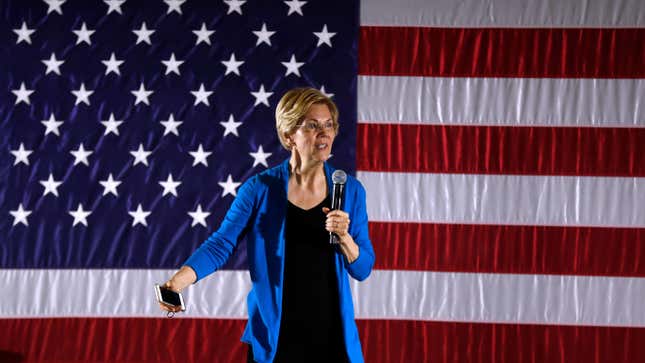

Earlier this week, Senator Elizabeth Warren released an updated version of the Comprehensive Addiction Resources Emergency (CARE) Act, a bill she first proposed with Congressman Elijah Cummings in 2018 to address the opioid crisis. The proposal would dole out $100 billion over the next decade to provide resources to public health departments, researchers, first responders, and communities around the country.
The CARE Act will also go after pharmaceutical companies that have lied to the public and fueled America’s opioid crisis. “The ongoing opioid crisis is about health care,” Warren wrote in a Medium post announcing the proposal. “But it’s about more than that. It’s about money and power in America — who has it, and who doesn’t. And it’s about who faces accountability in America — and who doesn’t.”
The basic premise of the proposal—which is correct, according to public health experts—is that current piecemeal efforts and the limited funding made available to address the issue have been wildly insufficient. Here’s the annual breakdown of new funding under Warren’s proposal:
$4 billion for states, territories, and tribal governments;
$2.7 billion for the hardest hit counties and cities, including $1.4 billion to counties and cities with the highest levels of overdoses;
$1.7 billion for public health surveillance, research, and improved training for health professionals;
$1.1 billion for public and nonprofit entities on the front lines, including those working with underserved populations and workers at high risk for addiction, and to support expanded and innovative service delivery of treatment, recovery, and harm reduction services;
$500 million to expand access to naloxone and provide this life-saving overdose reversal drug to first responders, public health departments, and the public.
It’s an ambitious proposal that, in typical Warren fashion, rises to meet the scope of the crisis. And Warren is correct about the ultra-wealthy people whose greed and deception helped fuel the current crisis—but there is more to be done than just increasing funding and holding pharmaceutical companies accountable. For a candidate like Warren, whose proposals often work in conversation with one another to point a more holistic portrait of a problem, there’s still an opportunity to do that on the opioid crisis and the War on Drugs.
In a statement emailed to Jezebel, Grant Smith, deputy director of national affairs at the progressive Drug Policy Alliance, described the CARE Act as groundbreaking. “This legislation presents a bold federal plan of action to address this national emergency of overdose deaths by prioritizing the public health needs of local communities, including long-term investments in effective treatment, harm reduction, and supportive services,” Smith wrote.
-

-

-

-

-

-

-

-

-

-

-

-

-

-

-

-

-

-

-

-

-

-

-

-

-

-

-

-

-

-

-

-

-

-

-

-

-

-

-

-








































